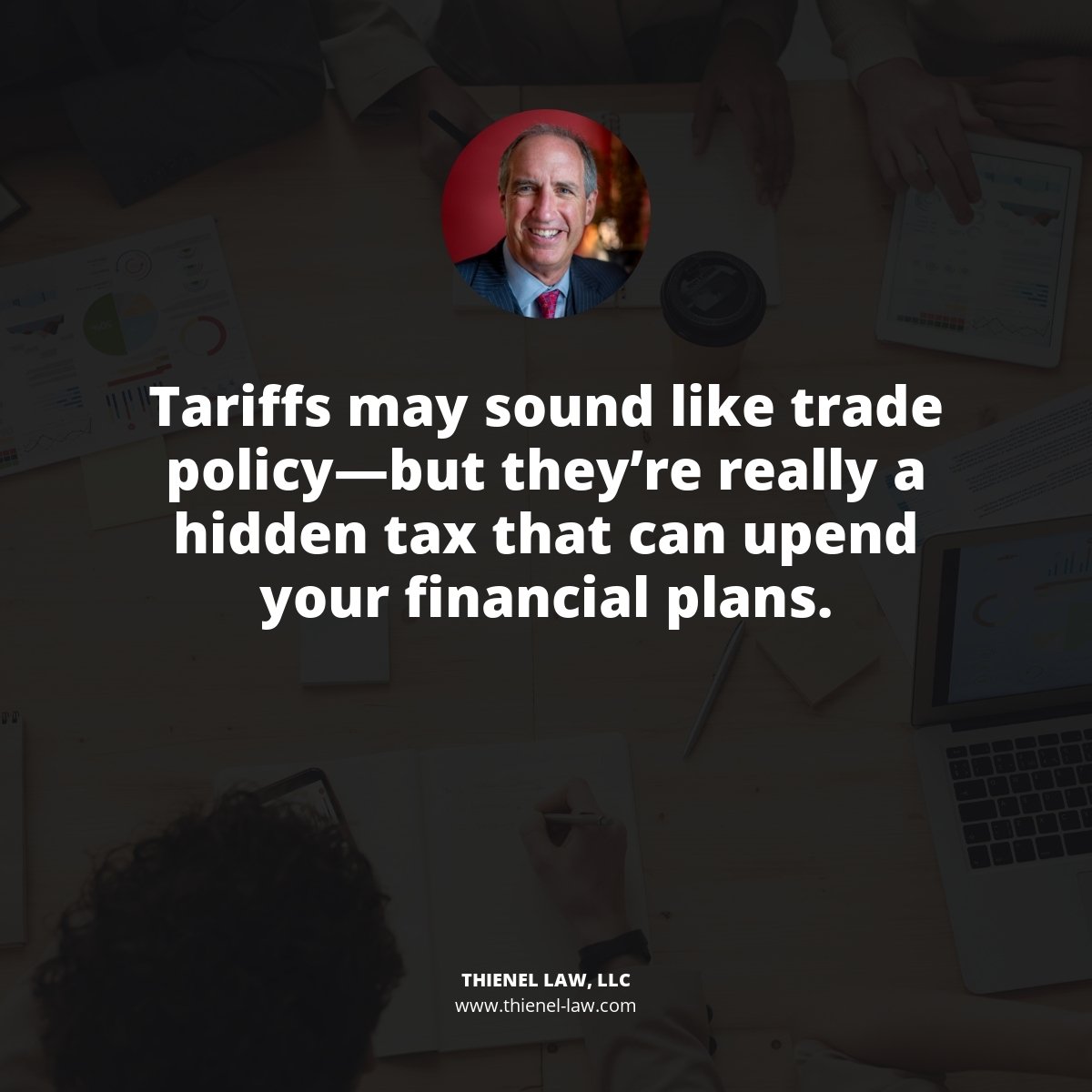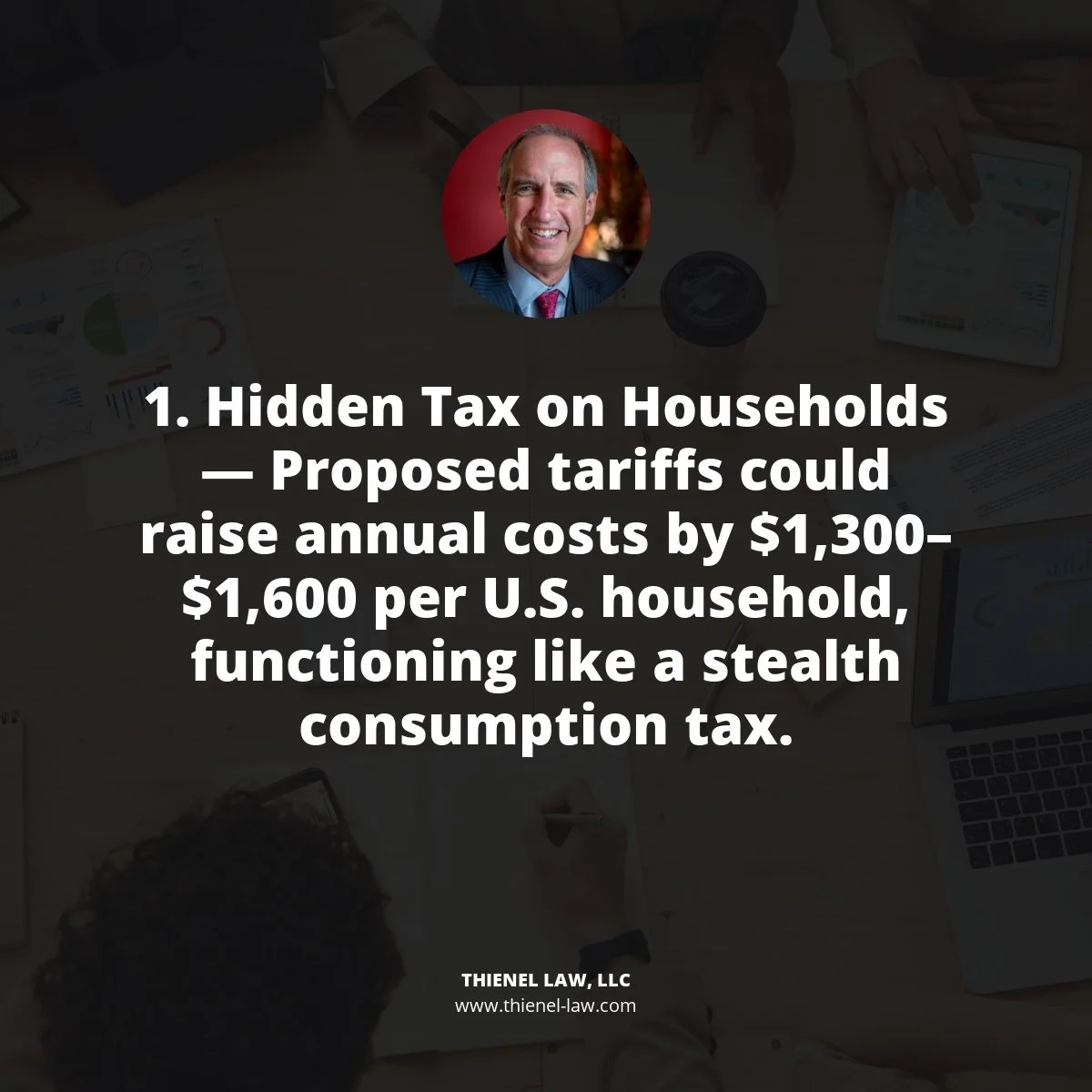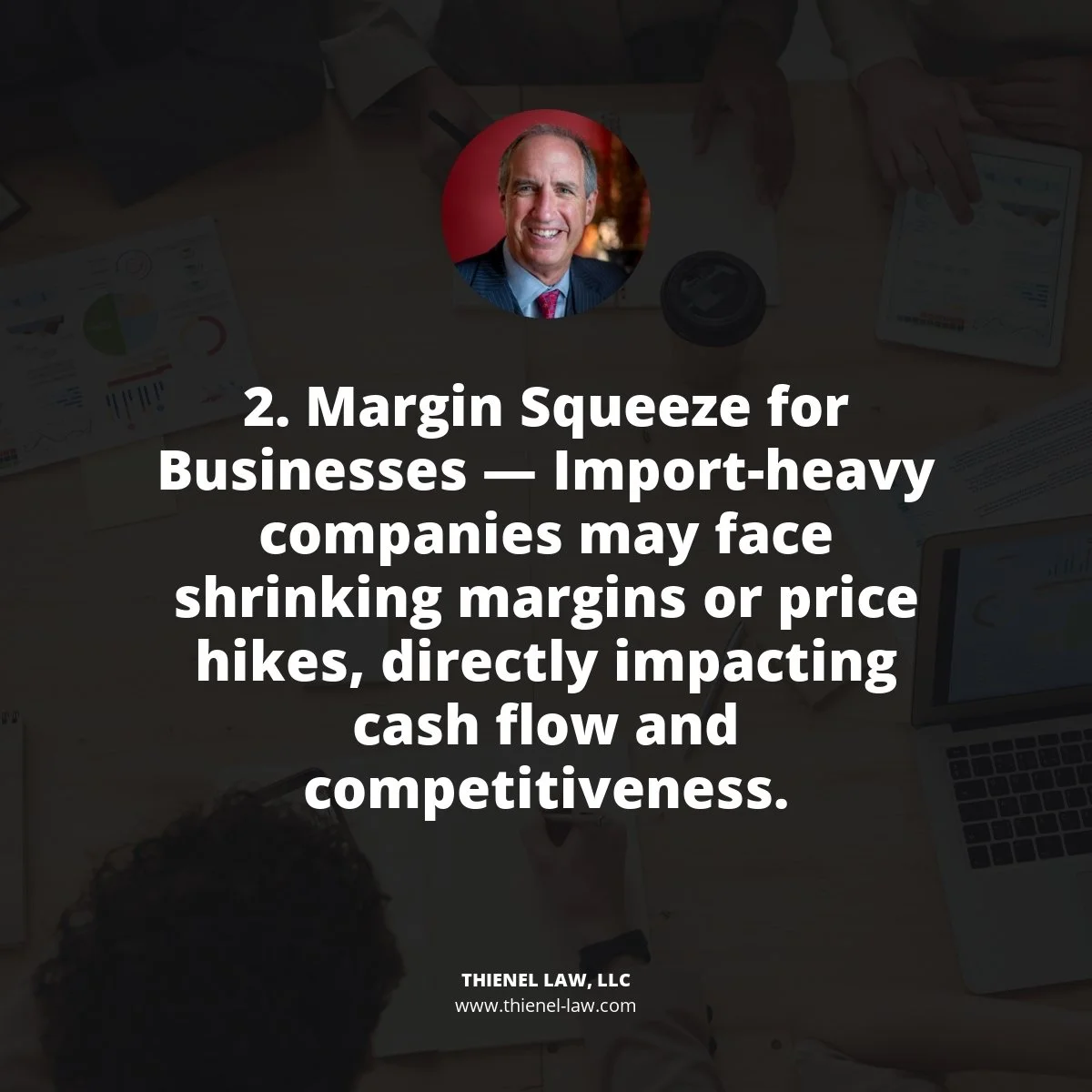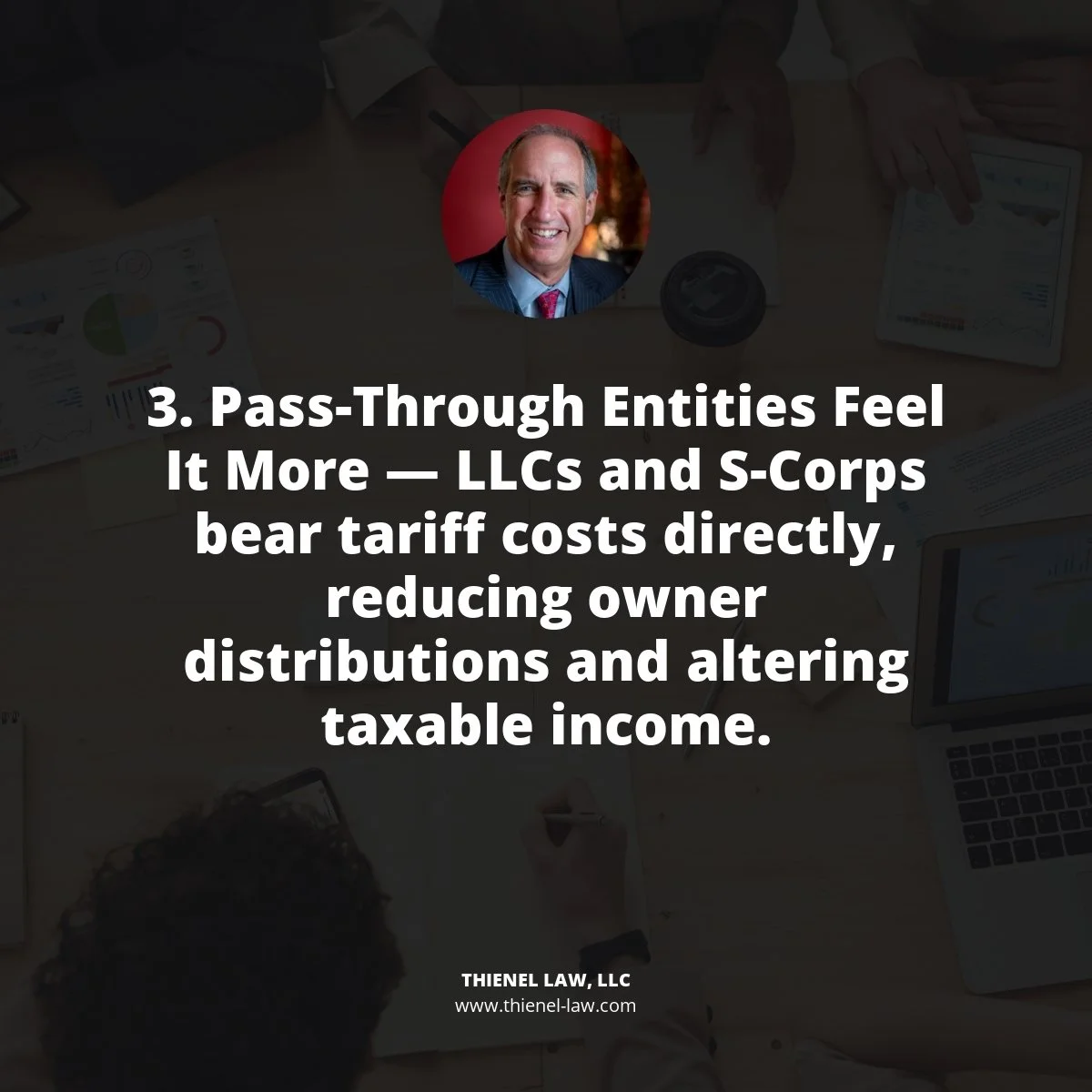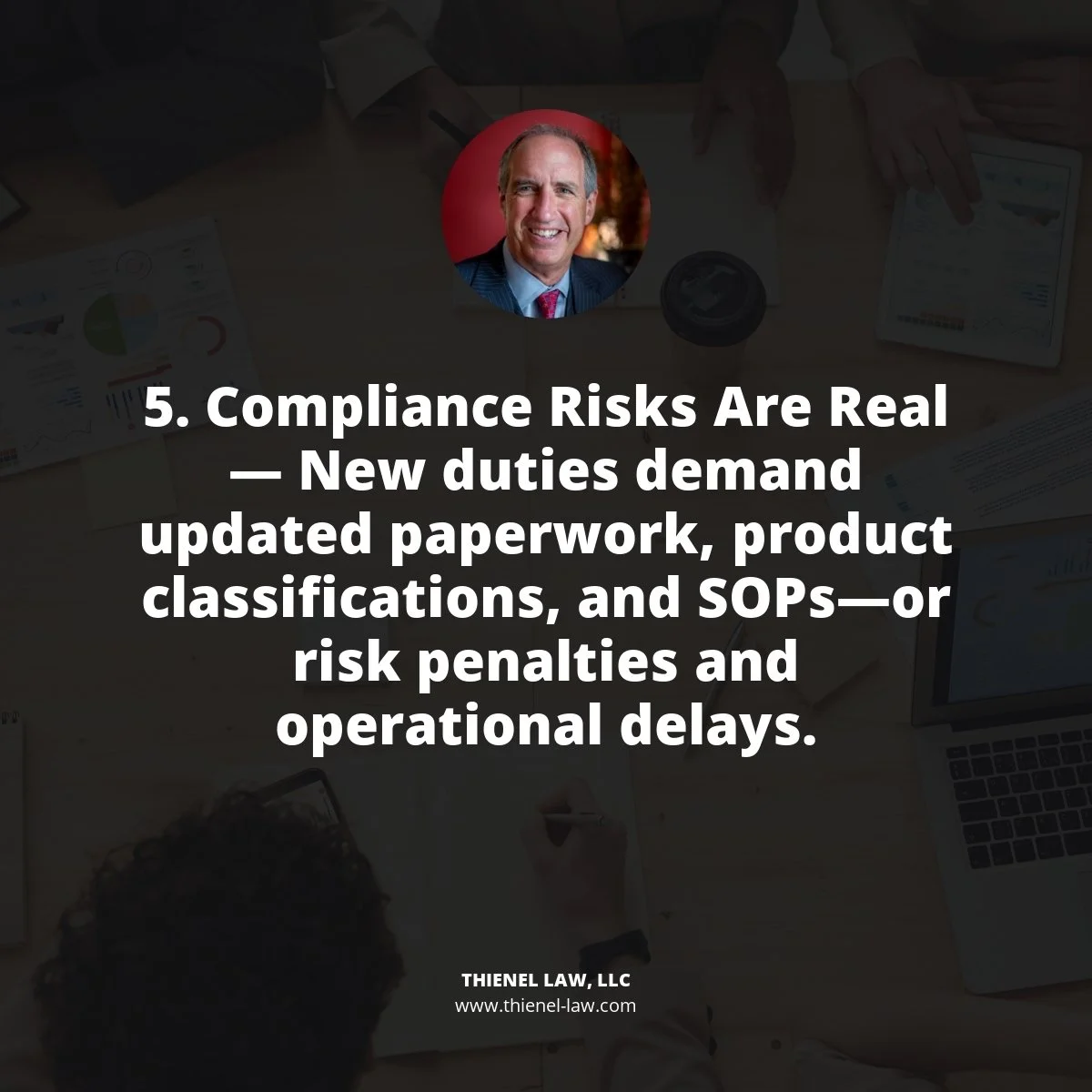How Tariffs Function Like a Tax—and What the Proposed Trump Tariffs Could Mean for You
Key Takeaways
Newly proposed tariffs could raise costs by over $1,600 per U.S. household in 2025 and nearly $2,100 in 2026, rising further if additional tariff rounds occur.
Although framed as trade initiatives, tariffs effectively function as tax increases on U.S. consumers and businesses.
Business owners, especially importers, retailers, and manufacturers, could see tighter margins and increased compliance burdens.
Pass-through entities like LLCs, S-Corps, and partnerships may face compounded effects through rising operating costs.
Strategic tax planning and entity structuring may help mitigate some financial pressures associated with tariff-driven inflation.
Why This Matters in the DMV Region
Here in Maryland, D.C., and Virginia, business owners, professionals, and high-net-worth individuals already navigate one of the most complex economic landscapes in the country. With the high cost of living, business operations, and regulatory oversight, any tax policy change—direct or indirect—has amplified consequences in our region.
The Trump adminstration recently laid out a new tariff plan that would amount to what some economists are calling a "stealth tax" on American households. Specifically, the average household could see an increase in annual living costs of over $1,600 in 2025 and up to $2,100 by 2026. If you're a business owner or investor in the DMV area, this isn't just academic—it affects your supply chain, profit margins, and long-term planning.
So let's break down what this really means—and how to prepare.
Tariffs Are Taxes—Just Structured Differently
Many people hear "tariffs" and think of fees paid by foreign exporters. In reality, it is U.S. companies and consumers who shoulder those costs once imported goods cross the border.
Let's look at an example:
Suppose your Maryland-based distribution company imports machinery parts from abroad.
New tariffs increase the cost per unit by 15%.
To maintain your margin, you either raise prices for your customers or absorb the cost.
Either way, the increased cost filters into the local economy—and directly or indirectly impacts your bottom line.
This kind of policy effectively operates as a consumption tax, especially on imported goods, which are critical to sectors such as construction, manufacturing, technology, and retail.
How This Affects LLCs, S-Corps, and Partnerships
Pass-through entities are particularly sensitive to gross margin pressures because taxable income flows directly to owners. With no corporate buffer, any increase in upstream costs—from materials to packaging to logistics—can quickly show up in your K-1.
If your S-Corp imports electronics components and tariffs raise your COGS (cost of goods sold) by 10%, your taxable income shrinks. The result is either increased owner liability if prices rise to meet cost increases, or reduced distributions if margin compression persists.
Let's take a hypothetical:
Your Virginia-based S-Corp earned $1M in gross income in 2024.
After expenses, distributed income to the owners totaled $300,000.
New tariffs inflate input costs by 10%, cutting your gross income to $900,000.
Now, after fixed expenses, only $200,000 is available for distribution.
That's not just a hit to your personal income; it could also affect your ability to reinvest in operations, retain talent, or expand in a competitive metro like D.C.
Estate and Trust Planning Takes a Hit, Too
Tariff-induced inflation affects more than active businesses. Consider estate plans focused on generational wealth and tax efficiency.
When consumer good prices rise across the board, higher annual living expenses may require families to dip into savings more frequently. This could delay or reduce contributions to trusts, affect funding strategies for irrevocable trusts, or force a reevaluation of gifting plans used to mitigate estate tax liability.
For example:
If your family pays $1,600 more in annual expenses due to tariff-related inflation, that's $16,000 over ten years—a sum that might have gone to a 529 plan, life insurance premium in an ILIT (irrevocable life insurance trust), or an annual exclusion gift.
Over time, these marginal shifts erode long-term financial efficiency—something many families in our region cannot afford amidst high real estate taxes and healthcare costs.
Risk Management for Businesses: Look Deeper than Prices
For businesses, the risks from tariffs go far beyond your next purchase order. Organizations must consider:
Contractual obligations: Check for escalation clauses in vendor agreements.
Commercial leases: Will higher costs eventually strain cash flow needed for rent or tenant improvements?
Employee retention: Can you afford competitive compensation if margin compression lingers?
Investor metrics: Will EBITDA take a hit just as you're preparing for a financing round?
These aren't speculative questions. Businesses in the DMV area are especially vulnerable because of high median wages and tighter regulatory scrutiny.
Smart companies are already:
Reviewing their vendor contracts for risk-sharing provisions.
Evaluating domestic sourcing alternatives, even if slightly more expensive.
Modeling multiple "what-if" forecasts around payroll, inventory, and pricing.
A business that survives regulatory shifts is one that plans for them—not just reacts.
Compliance and Record-Keeping Challenges
Tariffs impact not only pricing but also business compliance.
Your company may be obligated to classify imports differently, file new customs documentation, or adjust standard operating procedures. These changes may seem minor, but their cumulative burden matters—especially for smaller operations without in-house legal or compliance teams.
Missing a duty classification or failing to update invoice disclosures could result in penalties, delays, or audits. Legal guidance can often prevent costly errors by ensuring that your documentation protocols meet federal compliance requirements.
Compounding Effects on Professionals and High-Income Taxpayers
For professionals and high-net-worth households, tariffs act like a regressive tax. While federal income taxation is progressive, tariffs are cost-based and flat—meaning a $1,600 cost increase affects households earning $250,000 the same way as those earning $75,000. Only the latter feels it more intensely.
But affluent households—particularly professionals like physicians, law firm partners, or tech entrepreneurs in the DMV—should care because:
Investment portfolios may underperform due to tariff-driven inflation or global trade instability.
Leasing or buying commercial real estate becomes riskier if construction materials become more expensive.
Domestic hiring and staffing budgets may need reevaluation to maintain profitability.
Tariffs can strain the very financial ecosystem that DMV-area professionals rely on—especially when those plans depend on predictable cost structures and cash flow.
Strategic Moves to Consider
While the tariff policy landscape is still evolving, now is the time to review your legal and financial strategies. Consider the following actions:
Tax Projections: Recalculate expected net income for your business based on potential increases in input costs.
Trust and Estate Plans: Revisit annual giving strategies and trust funding mechanisms to account for increased day-to-day expenses.
Entity Structure Review: If your current entity structure leaves you exposed to tariff-related cost increases, a restructuring to hedge liability or shift sourcing may be appropriate.
Contract Audit: Have legal counsel review vendor contracts, leases, and purchase agreements for exposure to pricing volatility or unilateral changes.
Cash Reserve Evaluation: Higher consumer prices may mean higher working capital needs. Make sure your business and personal emergency funds reflect new realities.
Businesses don't need to change everything overnight—but they do need to think proactively.
None of these issues exist in isolation. A small increase at the customs table can lead to downstream effects across your entire financial ecosystem—from pricing and payroll to estate plans and exit strategies.
Final Thoughts: What You Can Do Now
The Trump tariff plan hasn't passed into law yet, but its impacts are worth preparing for. Smart planning now can protect your finances from damaging ripple effects later.
Whether you're running a multistate business, managing a family office, or building your long-term estate plan, the implications of tariff policies reach further than you might expect.
If you're unsure how tariffs or other tax changes apply to your business or personal situation, we're here to help.
Schedule a consultation with Steve Thienel to get legal and strategic advice tailored to your individual goals.
Better decisions start with information—and the right legal partner. Let's talk.
Serving Maryland, Virginia, and Washington, D.C. — Thienel Law provides business law, tax law, and estate planning counsel designed for forward-thinking individuals and companies.

